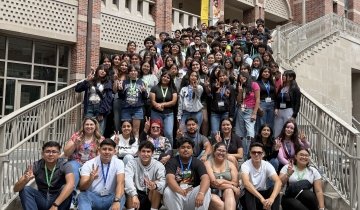As work on the CSU STEM Collaboratives study comes to an end, the Pullias Center for Higher Education is engrossed in another analysis of a program aiming to support access and success for a similar population of first-generation, low-income students.
The Thompson Scholars Learning Community (TSLC) is a living/learning community for students who are awarded the Susan Thompson Buffett Scholarship across three University of Nebraska campuses. In addition to grouping the scholarship recipients in courses, the program offers social support programs such as mentoring.
What's different about this study is its length — six years supported by the Susan Thompson Buffett Foundation — and that it goes beyond measuring traditional academic outcomes to examine psychosocial outcomes that have been associated with student persistence such as self-efficacy, resiliency, mattering and a sense of belonging.
“This study is long-term and methodologically rigorous: few studies in higher education have been able to track students both quantitatively and qualitatively in a longitudinal fashion,” says Professor Adrianna Kezar, who is serving as the project's principal investigator. “Very few studies have the resources to follow students so long. We're excited about the potential to come up with some really novel insights.”
Working alongside Kezar on the study are Rossier professors Darnell Cole and Tatiana Melguizo. After six months of planning, the investigators began following the TSLC 2015 freshmen cohorts at all three schools. They will continue collecting quantitative survey data on the 2015 group for five years, while also following the 2016 freshmen for four years. They will also be following a subset of students qualitatively through digital diaries.
The Pullias Center recently completed its report on the analysis of data collected between July 2016 and June 2017, the second year of the TSLC study. Cole notes that the most surprising discovery thus far is that the survey data shows that sense of belonging isn’t the most relevant psychosocial outcome, as was the assumption for a program that was designed to create a community where students feel they belong and can engage academically.
“After one year of analysis, we have found that the concept of mattering — that people value your impact and want you to do well — is more relevant than a sense of belonging at this point,” Cole says.
Using a longitudinal mixed-methods research design, the Pullias Center is seeking to identify which components of the program are most effective in developing psychosocial outcomes that contribute to academic success. Qualitative data is used to identify how program practices — such as interactions between students, program staff and faculty — contribute to psychosocial and academic outcomes.
“The rigorous mixed-methods design used in this study will enable us to learn not only whether the program was effective but also provide a nuanced understanding of the components that made it effective,” Melguizo says.
The Pullias Center is already working on an analysis of year three. The research will inform the broader field of scholarly study of higher education, learning communities and low-income college student success. It also will support evidence-based decision-making for the Buffett Scholarship program and will help partners at the University of Nebraska and colleges across the country to design their programs for maximum effectiveness.







